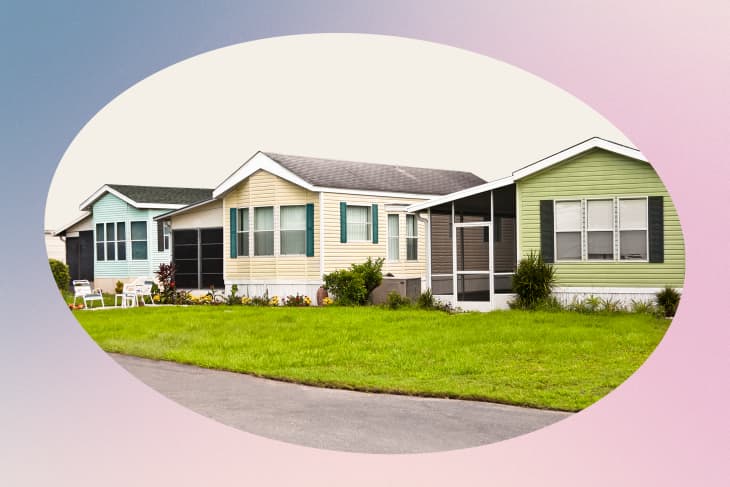I Live in a Mobile Home — And It’s Great. Here Are the Pros and Cons of Mobile Home Life

When my husband and I moved to Wisconsin, my in-laws owned a mobile home that they graciously offered to us rent-free. We were in the midst of paying off our debt, so the plan went like this: Work to pay off the debt, save to build up our emergency fund, save up for a down payment, buy a house. Over the years, we discovered there are pros and cons to mobile homes, especially as our plans changed and we spent longer in our mobile home than we expected.
After building our emergency fund, we found out we were pregnant and decided that my husband would stay home after our son was born while I continued to teach. That meant going down to one income, so we put our home-buying plans on hold (while continuing to save at a snail’s pace), and decided to stay where we were. Skip ahead nine years, two more kids, and a few job changes later, and we’re still here — and still saving for a house, though at a much faster pace now.
The Pros and Cons of Living in a Mobile Home
Pros:
- Buying a mobile home is cheaper than buying a single-family home.
- Mobile homes can be quite roomy.
- If you want to (or have to) live somewhere expensive, this may be your way in.
Cons:
- Your mobile home may go down in value.
- You have to pay rent on the land.
- Living in a mobile home can come with a stigma.
For many, living in a mobile home is not a choice, but a necessity. An estimated 20 million Americans live in mobile homes, and they make up the largest source of unsubsidized affordable housing in the country. We feel lucky to have had the option to choose to live in one, because they can offer a lot in the way of reaching future goals. So if you’re considering mobile home life, I’ve rounded up a few pros and cons based on my experience — and I’ve looked into the advantages of buying a mobile home, the disadvantages of buying a mobile home, the cost of owning a mobile home, and more. It’s really a complicated world — but I’ve tried to demystify it.
The Pros of Living in a Mobile Home
- One advantage of buying a mobile home is that it’s cheaper than buying a single-family home. The median sale price of a traditional home in November 2024 was $484,800, while the median price of a new manufactured home as of January 2024 was $148,100.
- Mobile homes can be quite roomy. Speaking of pricing, living in a mobile home could allow you to have amenities you might not otherwise be able to afford. In my case, I’m living in a spacious three-bedroom, two-bathroom mobile home with an attached garage and an acre of land — for a great price. Moving into a single-family home or a condo might mean giving up some of those things because of cost.
- If you want to (or have to) live somewhere expensive, this may be your way in. In Missoula, Montana — where I frequently look for real estate even though we’re not moving there — you can buy a mobile home for much cheaper, sometimes by magnitudes of hundreds of thousands, than a traditional stick-built home.
- It can be a transition space. If you buy land and want to build, or are in between moves, a mobile home can provide an affordable transition space.
The Cons of Living in a Mobile Home
- One disadvantage of buying a mobile home is that traditionally, mobile homes have been thought to go down in value, but this hasn’t necessarily been the case in recent years.
- You may have to pay unexpected costs of owning a mobile home, like lot rent. If you buy a mobile home in a mobile home park, you will have to rent the lot that it’s on and pay lot rent, as well as adhere to park rules.
- Financing is different from a traditional mortgage. Because a mobile home is considered personal property rather than real property, financing the purchase can be a little tricky.
- The stigma. I realize now that there is no such thing as a “real” house — and owning a single-family home doesn’t make me a better or worse person. For a long time, I wore mobile home living like a scarlet letter, not really hiding it, but not really mentioning it either. But as it has helped us reach other goals, I’ve come to see it as the blessing that it is.
Things to Consider if You’re Thinking of Buying a Mobile Home
If you’ve weighed all the pros and cons and still aren’t sure, here are a few other things to consider as you make your decision.
- What are your long-term goals? We found ourselves choosing a mobile home intentionally to begin with and accidentally stayed longer than we had planned, and now we’re leveraging our position to save up a large down payment while we wait for the right place. But we’ve always had our long-term goals in mind and knew this was moving us forward. Knowing why you’re choosing a mobile home over a traditional home is key to making it work for you.
- Do your research. Once you’ve nailed down your long-term goals and know that a mobile home will help you reach them, it’s time to do your research. Check the market in your area and see how mobile home sales compare with traditional home sales. Look into how much it will cost to remodel, redecorate, or upgrade.
- Can you get financing? If you need to finance the home, just know that the process may look different than for a traditional mortgage.